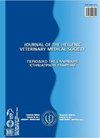Effects of rosemary essential oil as a feed additive on performance, rumen fermentation, and blood parameters in preweaning Holstein calves
IF 0.4
4区 农林科学
Q4 VETERINARY SCIENCES
引用次数: 0
Abstract
The objective of this study was to investigate the effects of rosemary essential oil (REO) supplementation on growth performance, some blood metabolites and rumen fermentation in calves throughout the suckling period. Fourty Holstein calves were randomly divided to four dietary groups. Each group consisted of 10 calves; control with no REO supplementation (CON), supplementation of 500 mg/d REO (REO1), supplementation of 1000 mg/d REO (REO2) and supplementation of 2000 mg/d REO (REO3). REO supplementation quadratically increased (P<0.05) the calf starter (CS) intake, average daily gain (ADG) and feed efficiency. Calves fed REO1 and REO2 had the highest CS intake and ADG. Ruminal ammonia-N concentration was lower (P=0.02) for calves fed REO3 than calves fed REO1, but total volatile fatty acids concentration was higher (P<0.01) for calves fed REO1 compared with calves fed CON and REO3. The concentrations of ghrelin, NEFA and BHBA increased linearly (P<0.05) with increasing levels of REO. Calves fed REO2 and REO3 had the highest concentration of ghrelin. Cholesterol concentration decreased linearly (P<0.01) with increasing REO levels on d 56. Calves fed REO2 and REO3 had the lowest cholesterol concentration. Also, serum IgG concentration was higher (P<0.01) in calves fed REO2 and REO3 compared with calves fed CON on d 28. It was concluded that the addition of different amounts of rosemary essential oil can positively change some rumen and blood metabolites of calves, as well as the supplementation of REO may have a beneficial effect on growth performance by increasing ghrelin.迷迭香精油作为饲料添加剂对断奶前荷斯坦犊牛生产性能、瘤胃发酵和血液参数的影响
本试验旨在研究添加迷迭香精油(REO)对泌乳期犊牛生长性能、部分血液代谢产物及瘤胃发酵的影响。选取40头荷斯坦犊牛,随机分为4组。每组10头;对照组不补充REO (CON)、补充500 mg/d REO (REO1)、补充1000 mg/d REO (REO2)和补充2000 mg/d REO (REO3)。添加REO可二次提高犊牛采食量、平均日增重和饲料效率(P<0.05)。饲喂REO1和REO2的犊牛CS采食量和平均日增重最高。REO3犊牛瘤胃氨氮浓度低于REO1犊牛(P=0.02),但总挥发性脂肪酸浓度高于CON和REO3犊牛(P < 0.01)。ghrelin、NEFA和BHBA的浓度随着REO水平的增加呈线性增加(P<0.05)。饲喂REO2和REO3的犊牛胃饥饿素浓度最高。在第56天,随着REO水平的升高,胆固醇浓度呈线性下降(P<0.01)。饲喂REO2和REO3的犊牛胆固醇浓度最低。在第28天,与饲喂CON的犊牛相比,饲喂REO2和REO3的犊牛血清IgG浓度较高(P<0.01)。由此可见,添加不同量的迷迭香精油可以积极改变犊牛瘤胃和血液代谢产物,添加REO可能通过增加胃饥饿素对犊牛生长性能产生有益影响。
本文章由计算机程序翻译,如有差异,请以英文原文为准。
求助全文
约1分钟内获得全文
求助全文
来源期刊

Journal of the Hellenic Veterinary Medical Society
VETERINARY SCIENCES-
CiteScore
0.60
自引率
0.00%
发文量
83
审稿时长
>12 weeks
期刊介绍:
The Journal of the Hellenic Veterinary Medical Society (J Hellenic Vet Med Soc) is a quarterly peer-reviewed journal that publishes articles in all aspects of veterinary science and related disciplines. It is published by the Hellenic Veterinary Medical Society and is indexed in the Web of Science and in Scopus.
There are no publication fees in the journal. Authors considering submitting manuscripts for evaluation and publication are requested to read carefully the instructions for authors and fully comply with them.
Non-complying manuscripts may be returned to the corresponding author for formatting.
 求助内容:
求助内容: 应助结果提醒方式:
应助结果提醒方式:


